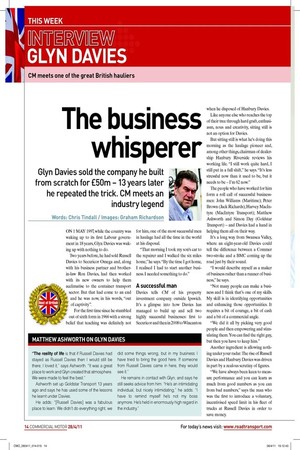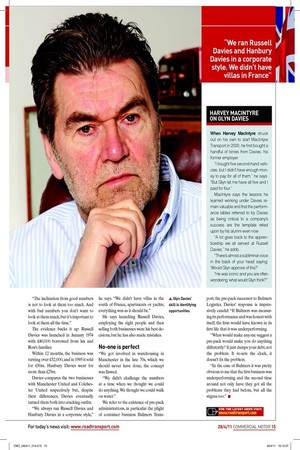The business whisperer
Page 10

Page 11

If you've noticed an error in this article please click here to report it so we can fix it.
Glyn Davies sold the company he built from scratch for £50m – 13 years later he repeated the trick. CM meets an industry legend
Words: Chris Tindall / Images: Graham Richardson
ON 1 MAY 1997, while the country was waking up to its irst Labour government in 18 years, Glyn Davies was waking up with nothing to do.
Two years before, he had sold Russell Davies to Securicor Omega and, along with his business partner and brotherin-law Ron Davies, had then worked with its new owners to help them acclimatise to the container transport sector. But that had come to an end and he was now, in his words, “out of captivity” .
For the irst time since he stumbled out of sixth form in 1966 with a strong belief that teaching was deinitely not for him, one of the most successful men in haulage had all the time in the world at his disposal.
“That morning I took my son’s car to the repairer and I walked the six miles home,” he says. “By the time I got home, I realised I had to start another business. I needed something to do.”
A successful man
Davies tells CM of his property investment company outside Ipswich. It’s a glimpse into how Davies has managed to build up and sell two highly successful businesses: irst to Securicor and then in 2008 to Wincanton when he disposed of Hanbury Davies.
Like anyone else who reaches the top of their tree through hard graft, enthusiasm, nous and creativity, sitting still is not an option for Davies.
But sitting still is what he’s doing this morning as the haulage pioneer and, among other things, chairman of dealership Hanbury Riverside reviews his working life. “I still work quite hard, I still put in a full shift,” he says. “It’s less stressful now than it used to be, but it needs to be – I’m 62 now.” The people who have worked for him form a roll call of successful businessmen: John Williams (Maritime); Peter Brown (Jack Richards); Harvey MacIntyre (MacIntyre Transport); Matthew Ashworth and Simon Day (Goldstar Transport) – and Davies had a hand in helping them all on their way.
It’s a long way from Swansea Valley, where an eight-year-old Davies could tell the difference between a Commer two-stroke and a BMC coming up the road just by their sound.
“I would describe myself as a maker of business rather than a runner of business,” he says.
“Not many people can make a business and I think that’s one of my skills. My skill is in identifying opportunities and enhancing those opportunities. It requires a bit of courage, a bit of cash and a bit of a commercial angle.
“We did it all by picking very good people and then empowering and stimulating them. You can ind the right guy, but then you have to keep him.” Another ingredient is allowing nothing under your radar. The rise of Russell Davies and Hanbury Davies was driven in part by a zealous scrutiny of igures.
“We have always been keen to measure performance and you can learn as much from good numbers as you can from bad numbers,” says the man who was the irst to introduce a voluntary, incentivised speed limit in his leet of trucks at Russell Davies in order to save money. “The inclination from good numbers is not to look at them too much. And with bad numbers you don’t want to look at them much, but it’s important to look at them all the time.” The evidence backs it up: Russell Davies was launched in January 1974 with £40,000 borrowed from his and Ron’s families.
Within 12 months, the business was turning over £32,000, and in 1995 it sold for £50m. Hanbury Davies went for more than £25m.
Davies compares the two businesses with Manchester United and Colchester United respectively but, despite their differences, Davies eventually turned them both into cracking outits.
“We always ran Russell Davies and Hanbury Davies in a corporate style,” he says. “We didn’t have villas in the south of France, apartments or yachts; everything was as it should be.” He says launching Russell Davies, employing the right people and then selling both businesses were his best decisions, but he has also made mistakes.
No-one is perfect
“We got involved in warehousing in Manchester in the late 70s, which we should never have done; the concept was lawed.
“We didn’t challenge the numbers at a time when we thought we could do anything. We thought we could walk on water.” We refer to the existence of pre-pack administrations, in particular the plight of container business Bulmers Trans port, the pre-pack successor to Bulmers Logistics. Davies’ response is impressively candid: “If Bulmers was measuring its performance and was honest with itself, the irm would have known in its irst life that it was underperforming.
“What would make anyone suggest a pre-pack would make you do anything differently? It just dumps your debt, not the problem. It re-sets the clock, it doesn’t ix the problem.
“In the case of Bulmers it was pretty obvious to me that the irst business was underperforming and the second time around not only have they got all the problems they had before, but all the stigma too.” ■














































